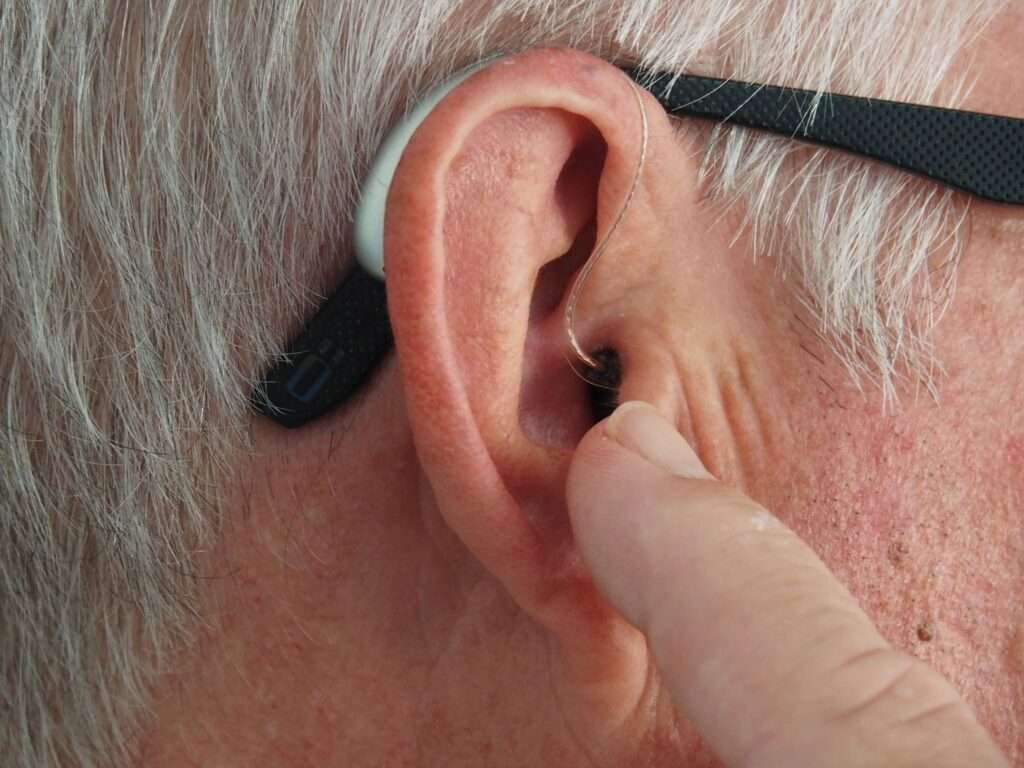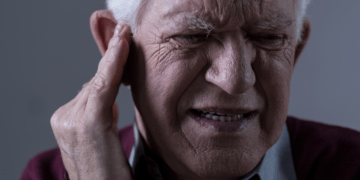In a world where aging gracefully is a formidable challenge, the intersection of hearing loss and cognitive decline has emerged as a critical issue for older adults. The National Institute on Deafness and Other Communication Disorders reports that approximately 37.5 million American adults experience some degree of hearing loss, not just as an auditory issue but as a potential gateway to cognitive challenges. This concern is further underscored by the National Institute on Aging, which states that over 5.8 million Americans aged 65 and older are living with Alzheimer’s dementia, suggesting a potential link between hearing impairment and cognitive decline. The figures highlight a stark reality. This raises a crucial question. Could the underutilized potential of hearing aids be a key solution? This blog aims to delve into the scientific nexus of auditory health and cognitive function. It explores the impact of addressing hearing loss on cognitive health. This could potentially alter the lives of millions of older adults. Join us as we explore this pivotal discussion’s facts, figures, and potential solutions.

Understanding the Link: Hearing Loss and Cognitive Decline in Older Adults
Statistical Insight: The Growing Concern of Hearing Loss and Dementia
The correlation between hearing impairment and cognitive decline is becoming increasingly evident in the context of aging populations. A large number of older adults are facing hearing impairment. This condition is more than just the inability to hear. According to the National Institute on Deafness and Other Communication Disorders, about 37.5 million American adults report some degree of hearing impairment. This figure highlights the widespread nature of this issue. This statistic takes on a more ominous tone when considering the findings from the National Institute on Aging, which indicate that more than 5.8 million Americans aged 65 and older live with Alzheimer’s dementia. The parallel rise of these two conditions in the older demographic underscores an urgent need to address and understand their connection.
Decoding the Science: How Hearing Loss Affects the Brain
The impact of hearing loss on the brain is not merely a matter of auditory deficiency; it has deeper cognitive implications. Hearing loss can lead to reduced auditory stimulation, which in turn may accelerate cognitive decline. This effect is particularly pronounced in older adults, as research findings from prominent health institutions noted. For example, a study from Johns Hopkins Medicine reveals a significant link between hearing loss and cognitive decline, pointing out that those with hearing loss experience a 30-40% faster rate of cognitive deterioration than their counterparts with normal hearing. Hearing impairment can strain the brain. It leads to reduced auditory input. As a result, the brain has to allocate more resources to process sound. This detracts from other cognitive functions. These include memory and problem-solving. Scientific understanding of this issue clarifies the mechanics of cognitive decline. It emphasizes the critical need for timely intervention in hearing health.

The Silent Impact: Untreated Hearing Loss and Accelerated Cognitive Decline
Unveiling the Research: Key Studies and Findings
The repercussions of untreated hearing loss on cognitive decline are more profound than previously understood. A growing body of research highlights the silent yet accelerating impact of hearing impairment on mental faculties. Key studies, such as those conducted by the National Institutes of Health, have shed light on this critical issue. Their findings demonstrate a tangible link between untreated hearing decline and an increased rate of cognitive decline, especially among the older population. These studies are pivotal in understanding the silent progression of cognitive impairment associated with hearing loss. They provide a scientific basis for the observation that individuals with untreated hearing loss exhibit a faster decline in cognitive abilities than those with normal hearing or those who use hearing aids.
The Numbers Speak: Alarming Trends in Cognitive Health
The statistics regarding cognitive health and hearing loss are alarming and call for immediate attention. The National Institute on Aging reports that individuals with untreated hearing loss have a 30-40% faster rate of cognitive decline compared to those with normal hearing. This striking statistic underscores the urgency of addressing hearing loss. It’s not just an auditory issue, but a significant factor in maintaining cognitive health. These numbers are not just mere data points. They represent a growing trend affecting millions of older adults. This highlights the critical need for awareness and intervention in hearing and cognitive health.
Hearing Aids: The Underexplored Solution to Cognitive Preservation

Breaking Down Myths: Dispelling Common Misconceptions About Hearing Aids
Addressing the misconceptions surrounding hearing aids is crucial in understanding their role in combating cognitive decline linked to hearing loss. Many people erroneously view hearing aids as cumbersome or solely for the elderly, which isn’t the case. Modern hearing aids are sleek, technologically advanced, and suitable for all ages. Dispelling these myths is vital to encourage more people to use these devices. As reported by Harvard Health, hearing loss can start as early as in the 30s or 40s, and using hearing aids can significantly improve quality of life and cognitive function.
Evidence-Based Benefits: How Hearing Aids Can Slow Cognitive Decline
The evidence supporting the use of hearing aids in slowing cognitive decline is substantial. Studies, including those from the National Institutes of Health, indicate that individuals using hearing aids for hearing loss exhibit a slower rate of cognitive decline than those who don’t use these aids. This is believed to be due to the enhanced auditory input that hearing aids provide, which helps maintain the brain’s cognitive functions. Embracing hearing aids as a preventive tool against cognitive decline is an important step in managing the long-term health of older adults.
Lifestyle Factors and Their Role in Hearing Loss and Cognitive Health
Diet and Exercise: Natural Allies in Auditory and Cognitive Wellness
Diet and exercise play an instrumental role in maintaining auditory and cognitive health, offering a natural defense against the effects of hearing loss. A nutritious diet rich in antioxidants and regular physical activity contribute to overall health and can positively influence hearing ability. For instance, a study from The Journal of Nutrition, Health & Aging suggests that certain nutrients and regular aerobic exercises can improve neural efficiency, thereby supporting auditory processing and potentially slowing down cognitive decline. Adopting a healthier lifestyle is beneficial for physical fitness and sustaining hearing and cognitive functions.
Mental and Social Stimulation: Key to Preserving Cognitive Function

Mental and social engagement are critical in preserving cognitive function, especially in the context of hearing loss. Activities that stimulate the brain and encourage social interaction can mitigate the risk of cognitive decline. According to Scientific American, engaging in mentally stimulating activities and maintaining social connections can help counteract the negative impacts of hearing loss on cognitive health. These lifestyle choices foster a stimulating environment for the brain, combating the isolation and reduced mental stimulation often associated with hearing impairment.
Bridging the Gap: Access and Affordability of Hearing Aids
Overcoming Economic Barriers: The Role of Insurance and Subsidies
One of the major hurdles in combating hearing loss is the access and affordability of hearing aids. The cost of these devices can be prohibitive for many, making it essential to explore the role of insurance and subsidies in making them more accessible. Fortunately, there’s a growing recognition of this issue, and steps are being taken to alleviate the financial burden. For example, some insurance companies and government programs are beginning to offer coverage or subsidies for hearing aids, thereby reducing the cost barrier. This shift is crucial for ensuring that those suffering from hearing loss can obtain the help they need without financial strain.
Technological Advancements: Making Hearing Aids More Accessible
Technological advancements are key in making hearing aids more accessible and user-friendly. Innovations in hearing aid design and functionality improve the user experience and contribute to cost reduction. Modern hearing aids are becoming more efficient, smaller, and easier to use, which enhances their appeal and accessibility. Technological improvements have made hearing devices more accessible to people. This has helped bridge the gap in hearing loss treatment and management. As technology evolves, hearing aids are expected to become even more accessible. This will further aid in the fight against hearing loss and its associated cognitive decline.
Proactive Steps: Integrating Hearing Loss into Routine Medical Care
The Importance of Regular Hearing Assessments
Integrating regular hearing assessments into routine medical care is a crucial proactive step in addressing hearing loss. Early detection of hearing issues is key to preventing or slowing down associated cognitive decline. Medical professionals recommend that individuals, especially older adults, undergo periodic hearing evaluations. These assessments can help identify hearing loss early, allowing for timely intervention. As highlighted by Harvard Health Publishing, early detection and management of hearing loss can significantly reduce the risk of associated cognitive problems. Regular hearing assessments are important. They should be as routine as vision checks. Untreated hearing loss can have a significant impact on overall health. Therefore, it is crucial to prioritize hearing health and get regular assessments.

Collaborative Healthcare: The Intersection of Audiology and Neurology
The intersection of audiology and neurology in healthcare is a collaborative approach. It manages hearing loss and its cognitive implications. Audiologists and neurologists work together to provide better treatment for hearing loss. Both specialists can bring their unique expertise to the table. Collaboration is essential in addressing hearing loss comprehensively. By working together, these professionals can create a more effective treatment plan. It affects auditory functions and has implications for cognitive health. Two specialties working together ensures a holistic approach to patient care. This enhances the effectiveness of treatments and interventions. It mitigates the impact of hearing decline on cognitive decline. The synergy between both specialties is beneficial.
Conclusion
Hearing impairment and cognitive decline are closely linked. Proactive measures are crucial in safeguarding the cognitive health of older adults. Recognizing hearing loss as a significant health issue is important. Effective solutions like hearing aids can help slow cognitive deterioration. These devices do more than just enhance hearing. They are vital in improving the quality of life.

The role of lifestyle choices in maintaining auditory and cognitive health cannot be overstated. Regular exercise, a healthy diet, and mental stimulation form a holistic defense against the risks associated with hearing loss. Hearing evaluations should be a part of routine healthcare for early detection and management.
As we conclude, let’s remember that addressing hearing loss is a crucial step toward preserving cognitive function. It’s a call to action for individuals, caregivers, and healthcare providers alike. As we age, it’s important to prioritize our hearing health and cognitive well-being. By embracing available solutions and making informed lifestyle choices, we can significantly impact our quality of life as older adults. Let’s work together to make hearing health a priority and reduce the likelihood of cognitive decline in the future.
We have compiled some of our top articles for your reading pleasure. Take a look at them whenever you have the time.
The Ultimate Guide to Boosting Your Oral Health
The Power of Water: Harnessing its Benefits for Optimal Human Health
Dental Dietary Supplements: A Comprehensive Guide
Achieve Your Leg Injury Recovery In Less Time
Blood Sugar Control: Effective Ways to Manage Diabetes










































